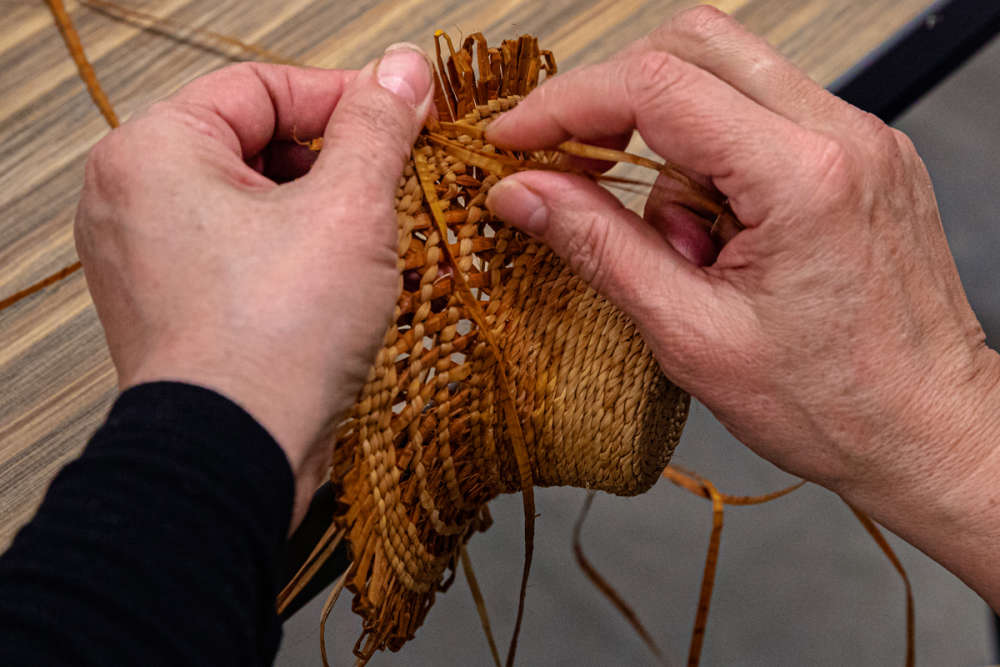
Photo of student weaving a cedar bark basket at SHI’s Sealaska Heritage Arts Campus. Photo by Connor Meyer, courtesy of SHI.
Juneau, Alaska (KINY) – Sealaska Heritage Institute (SHI) and the Institute of American Indian Art (IAIA) are urging the federal government to hold off on implementing proposed amendments to the Indian Arts and Crafts Act (IACA), a truth-in-advertising law that prohibits misrepresentation in the marketing of Indian art and craft products within the United States.
At a hearing today in Santa Fe, New Mexico, a panel from the U.S. Dept. of the Interior heard testimony from Indigenous people, including Tlingit artist Crystal Worl, who testified on behalf of IAIA in Santa Fe and SHI, where she serves on the institute’s Native Artist Committee representing IAIA.
In her testimony, Worl said the intent of the draft amendments is unclear and that some passages could seriously undermine the proper functioning of the IACA in protecting genuine Native American products.
She also said the department should focus more on strengthening the IACA and its board, the Indian Arts and Crafts Board (IACB).
“We recommend that the department take a step back and reconsider the overall structure of the regulations implementing the IACA,” said Worl, who testified along with SHI’s Chief Operating Officer, Lee Kadinger, and SHI’s legal counsel, Jacob Adams.
According to the department, the draft revisions seek to modernize the IACA’s regulations, which are implemented by its board.
The draft revisions bring a co-equal focus to promotional activities, expand the definition of Indian Product, allow for non-Indian labor to work on Indian Products in certain situations, and use a new certification trademark to certify that an item is an Indian Product, according to a letter to tribal leaders sent by the department’s Principal Deputy Assistant Secretary Joan Mooney from Policy, Management, and Budget, and Assistant Secretary Bryan Newland from Indian Affairs.
The panel was seeking input on the following questions:
• The draft revisions propose that additional items would be eligible to be marketed as an “Indian Product.” Do the revisions sufficiently account for the range of Indian art and crafts that Indian artists are presently creating?
• Should Native Hawaiian Organizations be included in the definition of “Indian Tribe” for purposes of regulations implementing the Indian Arts and Crafts Act?
• The draft revisions do not modify enforcement activities. Would additional enforcement tools, such as administrative forfeiture, provide confidence to Indian artists?
On the first question, Worl testified that the attempt to broaden the “Indian Products” definition is problematic.
“While we support the idea of exploring the scope of ‘Indian Products’ definition, we are strongly opposed to the consultation draft’s approach and believe that this discussion needs to begin with the question of whether, and to what extent, the definition needs to be modified,” she said.
Worl said SHI supports the inclusion of Native Hawaiians under the IACA, but that the text should be clearly drafted so that inclusion is not overly broad and unmanageable.
On the last question, Worl testified that currently, a number of means exist by which the terms of the IACA can be enforced, through administrative, criminal, and civil legal recourse.
“While refining the IACA enforcement provisions is welcome, we support an approach that prioritizes a discussion of proactively protecting and supporting Indian arts and crafts to make it more difficult for bad actors to peddle fake Native art in the first place. Enforcement is reactive instead of proactive. It is SHI’s position that efforts focused on the proactive foundation would be beneficial. We feel that the greatest impact on supporting Indian arts and crafts, and in turn the Indian arts and crafts market, could be made by thoughtfully and substantially developing and building upon the powers given to the IACA board—specifically the establishment, management, and enforcement of a federal nation-wide certification trademark for genuine Indian arts and crafts, that is a voluntary system,” said Worl, who took time away from her booth at the world-famous Santa Fe Indian Market to testify.
She encouraged the department to implement a strong and effective certification trademark system.
Friday’s hearing wrapped a series of consultations that also were held in Las Vegas, Nevada; Albuquerque, New Mexico; Oklahoma City, Oklahoma and Fairbanks, Alaska.
The department also held a Zoom consultation.
The deadline to submit written comments to consultation@bia.gov is Friday, Sept. 1, 2023.
The Indian Arts and Crafts Act (IACA) of 1990 (P.L. 101-644) is a truth-in-advertising law that prohibits misrepresentation in the marketing of Indian art and craft products within the United States.
It is illegal to offer or display for sale, or sell, any art or craft product in a manner that falsely suggests it is Indian produced, an Indian product, or the product of a particular Indian or Indian tribe or Indian arts and crafts organization, resident within the United States.
For a first time violation of the IACA, an individual can face civil or criminal penalties up to a $250,000 fine or a 5-year prison term, or both.
If a business violates the IACA, it can face civil penalties or can be prosecuted and fined up to $1,000,000.
Under the IACA, an Indian is defined as a member of any federally or officially State recognized tribe of the United States or an individual certified as an Indian artisan by an Indian tribe.
The law covers all Indian and Indian-style traditional and contemporary arts and crafts produced after 1934.
The IACA broadly applies to the marketing of arts and crafts by any person in the United States.
Some traditional items frequently copied by non-Indians include Indian-style jewelry, pottery, baskets, carved stone fetishes, woven rugs, kachina dolls, and clothing.
This post was originally published on this site be sure to check out more of their content.






